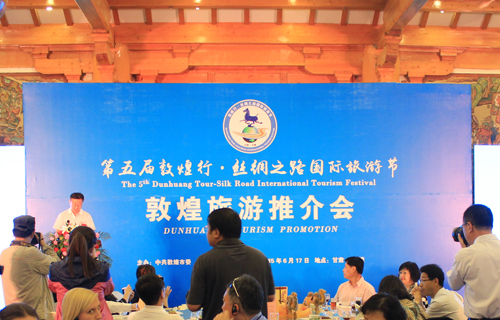News
Dunhuang drives Gansu tourism development forward
Updated: 2015-06-18By Xue Chaohua And Li Xiaoxu ( chinadaily.com.cn )
Visitors at present are able to enter Dunhuang city's famous tourist attractions of Crescent Moon Spring and Singing Sand Mountains in Gansu province with one ticket, valid for three days, said officials at the Dunhuang Tourism Promotion held in Gansu on June 17.
More than 50 journalists and 20 travel agencies representing 20 countries and cities attended the conference, including those from France, Italy and Canada.
Dunhuang has achieved fruitful results in developing its digital tourism recent years. Its Crescent Moon Spring and Singing Sand Mountains areas have received full WIFI coverage and fingerprint, face, identity card and mobile phone QR codes have been employed to substitute paper tickets. A tourist flow monitor is also under way.
"Dunhuang seeks to make full use of its geographic advantage alongside the Silk Road to prompt its tourism brand," said Sun Xiaoqiang, the Party chief of Dunhuang, at the conference.
 |
|
Dunhuang city in Gansu province holds the Dunhuang Tourism Promotion on June 17. [Photo/chinadaily.com.cn] |
Visitors can access online services, such as booking tickets and buying local specialties, through four platforms, including Tmall and Jingdong. Therefore, the city cooperated with them to facilitate the visitors' experience. Dunhuang also established cooperative relationship with 50 scenic regions in Xinjiang, Qinghai and Ningxia.
A forum, featuring online tourism services and Silk Road-related travel took place in Dunhuang on June 18. More than 50 travel agencies, administrations and representatives from scenic spots in regions along the Silk Road took part in the forum. To promote tourism in Northwest China, Dunhuang will host similar forums regularly.
In a bid to better serve the tourism industry, Dunhuang plans to open two international airlines. A Dunhuang-Hong Kong flight route will begin operating on June 29 and a Dunhuang-Seoul route will come into operation on July 16.
Edited by Jacob Hooson


